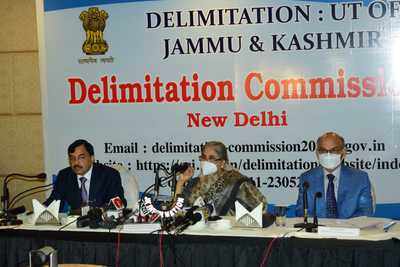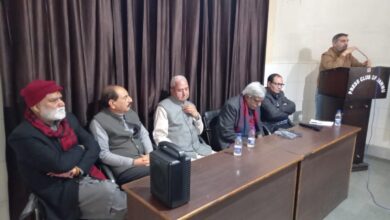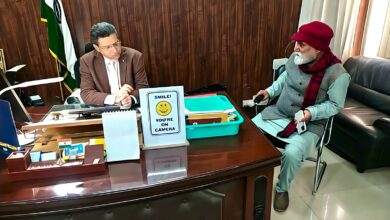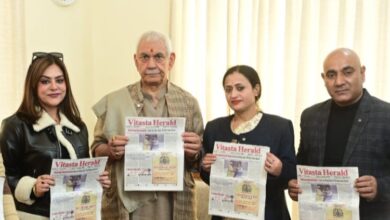Citizen ReportingFeature StoriesJ&K UTNewsState Politics
Trending
Delimitation: Kashmiri Pandits seek 4 reserved Assembly seats, list suggestions
Displaced Kashmiri Pandits submit memorandum to Chairperson of the Delimitation Commission UT of Jammu Kashmir Justice Mrs. Ranjna Desai on visit to Jammu on July 8, 2021
Memorandum submitted to the Hon’bl Chairperson of the Delimitation Commission UT of Jammu Kashmir Justice Mrs. Ranjna Desai on visit to Jammu on July 8, 2021.
Honourable Madam,
The reorganisation of Jammu and Kashmir in 2019 put an end to the institutionalised discrimination, restriction of fundamental rights and denial of justice that had been rampant in the erstwhile state for decades. The entire country, especially the residents of J&K, rejoiced and has since been witnessing a spurt in developmental activities, enhancement in delivery mechanisms and transparency & accountability in governance. All these developments have amplified people’s expectations and there is hope that the historical wrongs that occurred in the past due to the biased, belligerent and inequitable demarcation of parliamentary and assembly constituencies will finally be undone.
Victimised Minority
Historically, the religious minorities (both Hindus & Sikhs) of Kashmir have been the worst victims and have had to face organised marginalisation, exclusion and ultimately, outright expulsion. It was on all fronts that include social, economic and political spheres. This gradual, torturous process of exclusion and marginalisation resulted in the decline of their representation in the state legislature from 4 in 1951 to 0 in 2009 and 2014. Not only have they been completely eliminated from the state assembly, but their political influence within territorial constituencies has also been deliberately downsized to the lowest possible level.
This is a result of the gerrymandering of constituencies like Habba Kadal, Zadibal and Amira Kadal in Srinagar district; Anantnag, Bijbehara and Kothar in Anantnag and Devsar in Kulgam district; and Handwara and Kupwara in Kupwara district. Institutionalised ostracism and segregation packaged as ‘popular sentiment’ resulted in the enforced extirpation of practically the entire religious minority from the Kashmir province.
Even after forced Exodus we have been voting for the candidates both in Assembly and Parliamentary election, who do not care for us. Even a quick scan of Parliamentary records reveals that none- repeat no one- of these elected representatives have ever bothered to raise issues pertaining to minorities of Kashmir valley in parliament.
Institutionalised Exclusion
The process of eliminating the religious minorities of Kashmir has been continuing even after their physical extirpation. Besides targeted killings, wiping out their traces from collective memory of the place their numbers during census exercise are subjected to manipulative trimming as is evident from the census figures of both 2001 and 2011. We are being told that in 2001 there were just 100962 Hindus in Kashmir in 2001 out of which 90942 were males and only 10020 were females. Similarly in 2011 the figures show out of 162333 Hindus 146719 were Males and only 15614 females. No word is there about the Displaced population both registered as “Kashmiri Migrants’ and unregistered but part of Kashmir milieu numbering anywhere between 7-10 Lakhs. These blatant anomalies remain unchallenged in absence of community representatives in the Legislature.
Thus, we, on behalf of the religious minorities of Kashmir, are approaching you and this august institution to seek justice for our beleaguered community.
Displaced Community & Elections
Based on the figures revealed by the State election authorities there were a total of 38, 28,859 electors at the time of Parliamentary elections in 2019 out of which 99,043 were from the Displaced Community. 22,613 of them filled the complicated process of M-forms and 13,518 voted. This was a slight improvement from 2014 when there were a total of 36, 99,139 electors out of which 81,472 were from the Displaced community. 20,989 completed the complicated process and 9628 voted. During the recently conducted election for District Development Councils (DDCs) exclusion of Displaced Community was noticeable as a) all Political Parties except for Bhartiya Janta Party denied even the mandate to candidates from the community and b) not a single candidate could win because of the reasons mentioned earlier.
This is in spite of the fact that abandoned by the state administration under successive governments the entire Displaced population is scattered all over the Globe. Domicile Law in place has entitled all those citizens of Jammu Kashmir who left the erstwhile state because of any reason to reclaim their roots. Guaranteed political Empowerment/space will not only encourage but help the dislocated population in their dignified and secure integration with the milieu.
Political Empowerment-Globally Recognised Right
It will be pertinent to mention here that it is an internationally recognised obligation to ensure that mechanisms are in place so that the diversity of society with regard to minority groups gets reflected in public institutions such as parliaments, civil services, state Legislatures etc.
During its second session, in November 2009, the Forum on Minority Issues of the United Nations Minorities Declaration, provides for the right of persons belonging to national or ethnic, religious and linguistic minorities “to participate effectively in cultural, religious, social, economic and public life” and asked states to ensure that beyond token representation, minority representatives should have an equally substantial influence on the decisions being taken. Only then can there be actual collective ownership and impact of such decisions.
Around the world, many nation states have taken cognisance of this obligation and made sure that minority groups are empowered to elect representatives of their choice. For example, both New Zealand and the US worked to implement effective increases in minority representation in national legislatures. In USA, this was achieved by drawing special majority-minority districts that maximize the number of blacks in a congressional district. Other countries such as Belgium, Lebanon, Slovenia, and Zimbabwe also make special provisions for ethnic minority representation.
Affirmative Actions in India
In our nation itself, the constitution makers were conscious of this responsibility of ensuring the inclusion of marginalised, underprivileged and deprived sections of the society. This led to the concrete measure of political reservation for Scheduled Castes (SC) and Scheduled Tribes (ST). Even Anglo-Indian representation was ensured in the form of seats in Parliament and state assemblies.
The Sangha constituency, one of the 32 seats in the Sikkim assembly, is another example of special, affirmative accommodation to ensure representation of underprivileged sections. It has no geographical boundaries and comprises around 3500 monks and nuns as voters.
Recently We as country have also recognised and honoured democratic rights of absentee citizens (NRIs) and there is a clamour for providing nominated seats to them in the Lok Sabha.
The Jammu and Kashmir Reorganisation Act, 2019 (15) also empowers the Lieutenant Governor of the successor Union territory of Jammu and Kashmir to nominate 2 members to the Legislative Assembly to give representation to women, if in his opinion, women are not adequately represented.
This is under the same principle recognising the need to include under-represented sections of the society and providing adequate & effective participation in policy planning and decision making process. This is an unarguable fundamental of democracy.
Positive Discrimination under Constitution
Madam Chairperson,
We are aware that Article 15 of the Constitution of India prohibits any kind of discrimination on grounds of religion, race, caste, sex or place of birth. It prohibits discrimination on the grounds of religion, race, caste, sex or place of birth. However, the state can make any special provision for women and children and also for the advancement of any socially and educationally backward classes of citizens. This is necessitated because in spite of constitutional sanction against it discrimination of various kinds exist on the ground.
The Union Government set up the National Commission for Minorities (NCM) under the National Commission for Minorities Act, 1992. Six religious communities, viz; Muslims, Christians, Sikhs, Buddhists, Zoroastrians (Parsis) and Jains have been notified in Gazette of India as minority communities by the Union Government all over India including the states in which one or the religious minority is a Majority. Thus we cases where notified minority is enjoying rights as local majority and national minority at the same time. Jammu Kashmir is the classical example of this contradiction.
In this vein, we, the religious minorities of the Kashmir valley submit with respect that:
a. Owing to our systematic marginalisation, exclusion, discrimination and ultimately expulsion from our homes and hearths and
b. Recognising the universally accepted principle of taking affirmative action to ensure adequate and meaningful minority representation in public institutions
Our Petition
A well-defined and constitutionally guaranteed mechanism is ensured by the amply empowered and profusely cognisant Delimitation Commission to ensure appropriate, adequate, plausible and quantifiable representation of the Religious minorities of Kashmir valley by way of rightful participation in the mainstream political scene through a guaranteed electoral mechanism.
In this regard, we put forward the following suggestions which will help in achieving the aforementioned obligations:
This in our Opinion can be achieved by:1. Reserving the four seats represented by, the Religious minorities of Kashmir valley in first legislative Assembly/Constituent Assembly of Jammu Kashmir for them.2. Identifying one seat each in the Parliamentary Constituencies of Kashmir valley and transferring all minority votes to the identified Constituencies.3. Defreezing of seats reserved for areas under illegal occupation of Pakistan and from these defreezed seats falling under Kashmir province is reserved for the Religious minorities of Kashmir valley.4. Providing for Nomination by the government of India on the pattern that was there for the Anglo-Indian community till recently.
FOR AND ON BEHALF OF THE DISPLACED KASHMIRI PANDITS







